#this kind of thing is such a pet peeve of mine like there’s such an interesting story here but you’re choosing the easy to digest one that
Text
"mario only saves peach to get a kiss on the cheek" WRONG mario saves peach because shes his friend and he loves her and also because he's a good person who wants to help others. the cheek kiss is merely a nice bonus
#super mario#mario#princess peach#also ive always hated the way that#people act as if mario is entitled to affection bc he saved her#its usually spouted by weird dudebros with zero boundaries. wonder what the connection might be there 🤔#anyway mario saves peach bc he cares about her and also like#hes a good person that helps people when they need it????#idk usually i dont get so riled up over this kind of thing but like#it really pokes at a particular pet peeve of mine
159 notes
·
View notes
Text
Watching this doc about the comedy store and somehow it spends like less than 15 minutes on the comedy strike which is nuts and I’m sure has nothing at all to do with the fact that the guy who made it was one of the guys who broke the strike… also how are you going to barely talk about Steve Lubetkin at all the most interesting thread of the whole story. And praise Mitzi Shore so much and not even bring up the fact she was making piles of money off these people and refused to even just give them a cut of the cover charge. WHATEVER!!!
#my interest in learning more about Richard Lewis has snowballed into something else….#this kind of thing is such a pet peeve of mine like there’s such an interesting story here but you’re choosing the easy to digest one that#makes you feel better about urself and simplfy lubetkin as a guy with mental health issues w/o even#mentioning how getting blackballed for striking played in a role in that
7 notes
·
View notes
Text
Bit of a random post, but I think one of the worst things about having a brain (just in general) is how hard it is to keep yourself from orienting your expectations exclusively inside of your own experiences.
I think there's a lot to be said about people who build a very specific kind of hype up in their head, and will inevitably disappointed because the actual product was never going to align with their mental fanfiction, but
On a smaller and simpler note, my love for horror video essays is tempered by the fact it feels like 99% of the internet has a much more fragile stomach for the dark and disturbing than I do, and I can't even sit through a horror movie or play a horror game because I'm a goddamn coward-
(And the remaining 1% is into stuff that actually makes me squeamish in a way I can't quite handle, but they do seem to be living their best lives, and more power to them)
But generally my struggle is when someone builds up, like, a manga as "one of the most dark and disturbing things [they've] ever read", especially if it's a "no one should EVER read/watch/play this"/"I read/watch/played this horrible thing so YOU don't have to!", and then I go to experience it, and it's always
I've wrote/read/watched/played worse, and I am always expecting something "worse".
And sometimes it's just, you know, different things disturb different people; I don't find existential "we're just a tiny speck in the universe" stuff scary, but there's plenty of people that do, but I do find certain other things genuinely terrifying for how my brain will take the concept and try to be like "hey could you survive this? lol no you can't, you'd die dummy :) no escape", but those won't frighten other people as much (if at all)
But sometimes it's like
"Damn, if you tried to play/watch/read some of my top favorite non-horror things, you'd just crumble into dust, wouldn'tcha, bud?"
#not important#chaotic rambles#anyways if anyone has some good video essays to recommend i'd love some#particularly if it's light on implying/stating that anyone who likes dark/taboo content is a weird freak that shouldn't be trusted#honestly people liking certain kinds of stories being an inherent red flag is a big pet peeve of mine#everything has fans. Everything. yes even non-ironic “takes it seriously” fans#what you shouldnt be worried about is “does this person LIKE this story???”/“do they enjoy it for the Correct Reasons???”#you should worry more about. you know. “how does this person treat other people? are they properly separating fiction from reality?”#that kinda thing#also there's just. no way you're always hitting it out of the park forever with objectively correct opinions#i think it's healthy to have your weird little stories that are generally either really unpopular or really niche but you fully adore them#and it's healthy to try and mind that just because you feel Very Strongly about something doesnt mean you have The Objective Opinion on it#all opinions are subjective and experiences are relative
3 notes
·
View notes
Text

𝐂𝐗𝐕. Dáinsleif's last act for Teyvat —threads of all fate reweaving—.
Sometimes I think about Dain's last act in this story being that he reweaves the threads of all fate, which makes me wonder: Is this related to the Abyss Order messing so badly with their Loom of Fate operation that needs to be undone? Is the constellation structure, most likely than not a control system (you can't tell me that the Archon War wasn't just that in order to get rid of all the several gods that existed in Teyvat save for very few in order to make it easier to control them and what they do :| )? Or maybe a combination of both? Whatever it is, it's the fact that the Traveler has to go over Dain first in order to do that which makes me believe that he can do it himself, alas—
#◟༺✧༻◞ events to be remembered in blue veins ┊addendum.┊#gotta love that kind of writing in G.enshin#about making Traveler be 100% necessary everywhere#even though the characters of Teyvat can do stuff themselves#if you didn't know yet#this is a no ex deus machina Traveler zone sowwy djfhjg#I love the story to bits and its lore far more#but sorry this is one huge pet peeve of mine here#also reason why I decided to have my portrayal#as canon divergent in some instances can you tell#back to the topic though#I can't gauge just how meaningful#doing something like that would be#considering how unfair fate is in this world#and how it's basically decided by the Heavenly Principles#like Orobashi's#that one was so hardcore#another reason I think Dain might be able to do it#is because of this guardian trope#of guarding something very important#while at the same time having a portion of that power themselves#or have the key to the solution themselves#I also wonder how far and wide#reweaving the threads of all fate would influence#if it's coming with Irminsul#and it's like a successful thing of what Scaramouche tried#then I wonder if it'd change the deaths of others#or if it'd be like including an alternate timeline#and that's where things change#the latter is a move HYV did tbh
6 notes
·
View notes
Text
it is okay to let people have "their thing" in rp. there is nothing wrong with not competing with them — we all want "our thing," so it's okay to let people have their own. it's just something i've noticed and have to be transparent about. i cannot tell you how many times i have seen this trait in roleplayers (not just in instances that happen to me, but to others). someone is posting happily about their content and then someone else is "inspired" to literally do the exact same thing but with a "lil twist." it's very obvious, and honestly? very embarrassing ..... it's very frustrating, and i see this as a pervasive, very irritating behavior. let people have their things as you would (and do) want your own. we are not here to compete but to co-exist and collaborate. the more original your concept, the more interesting the plot! sometimes the "ideas" are not ideas, but they are memories of what has been seen. a memory. again, it's not surprising there would be multiple nurses, doctors, etc, but we can all tell when a "fresh idea" is someone else's. again, this is not just something "about me," but something i actively see happening to all of you, too.
#this is kind of just a general thing BC ive seen it for years#and it's just a personal pet peeve of mine even if it's not happening to me#example: someone writes a yyh muse and then suddenly everyone is writing that muse#that's just an example i could go on it's pervasive with ocs#sorry if this is out of nowhere and ill be back to replies but this is just my oPiNiOn#to be clear idc if there's multiple of muses#im talking about directly basically copying someone and it happens to all of you and i see it lmao#and i see it happening too and im not here to call anyone out#but lbr we cannot pretend this isn't an issue and ive never seen anyone say anything#ok back to replies#idc if you reply to this or like reblog it it's fine
7 notes
·
View notes
Text
to me modern ellie will always be that rural tomboy texas girl. you mean to tell me the girl who's had physical labor jobs the entire game suddenly just sits inside all day being a toxic gamer and texting me on snapchat? insane, unbelievable. also why is she still toned if she doesn't do anything at all, that's always been a pet peeve of mine.
to me she's that girl you'd see getting rowdy with friends and she's covered in dirt n' grass. she'd point at cool bugs like a mantis or beetle and go "look at that thing!" modern ellie is a bug girl to me. she's the girl you'd see riding around in a farmer pickup with joel and anytime you come to her house she's always doing some kind of farm work like taking care of chickens, tending to gardens and crops, whatever. you'll see ellie with her friends poking around those old buildings around town that haven't been touched in years
maybe it's how jackson kind of reminds me of my town and the whole farm thing she had with dina that makes me have such a rural connection to her but idk. also texas farmer joel just makes sense, and he's technically her dad. so she deserves to be a texas farmer too.
#the last of us ii#the last of us part 2#the last of us#ellie williams#ellie the last of us#ellie tlou#ellie tlou2#tlou 2#tlou headcanons#also btw this isn't much of a diss to the common modern aus i really don't care#i feel someone is gonna read this as a diss it's not#bug girl ellie... ehehe#also rural farmer ellie is just an excuse to still have shimmer. i love you shimmer!!!!
562 notes
·
View notes
Text
Apes are a kind of monkey, and that's ok
This is a pet peeve of mine in sci comm ESPECIALLY because many well respected scientific institutions are insistent about apes and monkeys being separate things, despite how it's been established for nearly a century that apes are just a specific kind of monkey.
Nearly every zoo I've visited that houses apes has a sign somewhere like the one below that explains the supposed distinction between the two groups, focusing on anatomy instead of phylogeny.
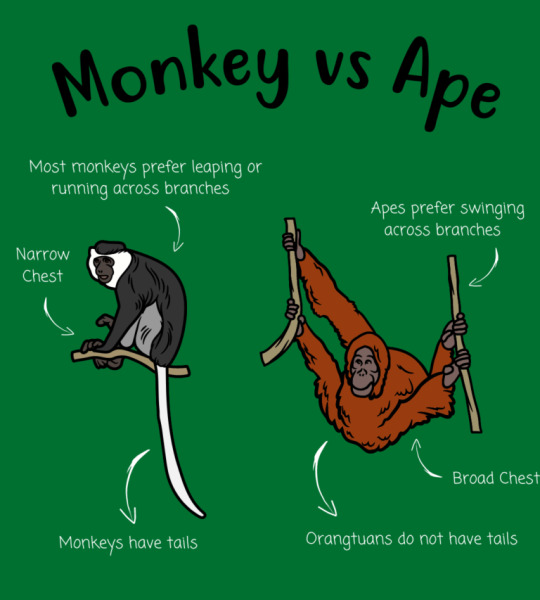
(Every time I see a graphic like this I age ten years)
Movies even do this, especially when they want to sound credible. Take this scene from Rise of the Planet of the Apes:
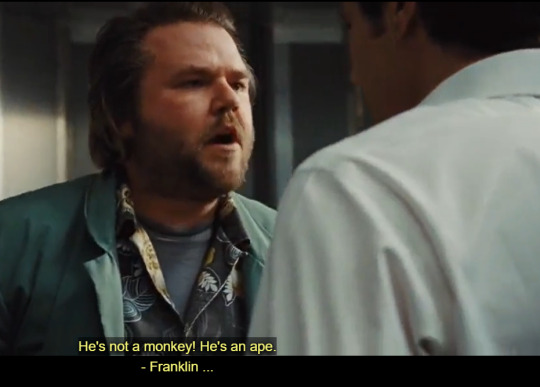
This guy Franklin is presented as the authority on apes in this scene, and he treats James Franco calling a chimpanzee a monkey like it's insulting.
But when you actually look at a primate family tree, you can see that apes are on the same branch as Old World monkeys, while New World monkeys branched off much earlier.

(I'm assuming bushbabies are included as "lorises" here?)
To put it simply, that means you and I are more closely related to a baboon than a baboon is to a capuchin.
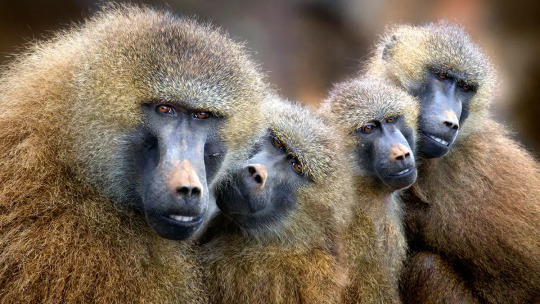
Either the definition of monkey includes apes OR we can keep using an anatomical definition and Barbary macaques get to be an ape because they're tailless.

"I've got no tails on me!"
SO
Why did all this happen? Why did we start insisting apes are monkeys, especially considering the two words were pretty much interchangeable for centuries? Well I've got one word for ya...

This the attitude that puts humans on a pedestal over other life on Earth. That there are intrinsically important features of humanity, and other living things are simply stepping stones in that direction.
At the dawn of evolutionary study, anthropocentrism was enforced by using a model called evolutionary grades. And boy howdy do I hate evolutionary grades.
Basically, a grade is a way of defining a group of animals by using anatomical "complexity". It's the idea that evolution has milestones of importance that, once reached, makes an organism into a new kind of thing. You can almost think of it like evolutionary levels. An animal "levels up" once it gains a certain trait deemed "complex".
You can probably see the issue here; that complexity is an ephemeral idea defined through subjectivity, rather than based off anything truly observable. What makes walking on 2 legs more complex than walking on four? How are tails less complex than no tails? "Complexity" in this context is unmeasurable, therefore it is unscientific. That's why evolutionary grades suck and I never want to look at one.
For primates, this meant once some of them lost their tails, grew bigger brains, and started brachiating instead of leaping, they simply "leveled up" and became apes. Despite the early recognition that apes were simply a branch of the Old World monkey family tree (1785!), the idea of grades took precedent over the phylogenetic link.
In the early years of primatology, humans were even seen as a grade "above" apes, related but separated by our upright stance and supposed far greater intelligence (this was before other apes were recognized tool users).

It wasn't until the goddamn 1970s that it was recognized all great apes should be included in the clade Hominidae alongside humanity. This was a major shift in thinking, and required not just science, but the public, to recognize just how close we are to other living species. It seems like this change has, thankfully, happened and most institutions and science respecting folks have accepted this fact. Those who don't accept it tend to have a lot more issues with science than only accepting humans as apes.

And now, we come to the current problem. Why is there a persistent idea that monkeys and apes are separate?
I want to make it clear I don't believe there was a conscious movement at play here. I think there's a lot of things going on, but there isn't some anti-monkey lobby that is hiding the truth. I think the problem is more complicated and deals with how human brains and human culture often struggle to do too many changes at once.
Now, I haven't seen any studies on this topic, so everything I say going forward is based on my own experience of how people react to learning apes (and therefore, humans) are monkeys.
First off, there is a lot of mental rearranging you have to do to accept humans as monkeys. First you, gotta accept humans as apes, then you have to stop thinking in grades and look at the family tree. Then you have to accept that apes are on the Old World monkey branch, separate from the New World monkeys.
That's a lot of steps, and I've seen science-minded zoo educators struggle with that much mental rearranging. And even while they accept this to an extent, they often find it even harder to communicate these ideas to the public.
I think this is a big reason why zoos and museums often push this idea the hardest. Convincing the public humans are apes is already a challenge, teaching them that all apes are monkeys at the same time might seem impossible.
I believe the other big reason people cling to the "apes-aren't-monkeys" idea is that it still allows for that extra bit of comforting anthropocentrism. Think of it this way; anthropocentrism puts humans on a pedestal. When you learn that humans are apes, you can either remove the pedestal and place humans with other animals, OR, you can place the apes up on the pedestal with humanity. For those that have an anthropocentric worldview, it can actually be easier to "uplift" the apes than ditch the pedestal.
Too make things worse, monkeys are such a symbol of a "primitive" animal nature that many can't accept raising them to the "level" of humanity, but removing the pedestal altogether is equally painful. So they hold tight to an outdated idea despite all the evidence. This is why there's often offense taken when an ape is called a monkey. It's tantamount to someone calling you a monkey, and that's too much of a challenge to anthropocentrism.
Personally, I think recognizing myself as a monkey is wonderful. Non-ape monkeys are as "complex" as any ape. They make tools, they have dynamic social groups, they're adapted to a wide range of environments, AND they have the best hair of all primates.
I think we should be honored to be considered one of them.

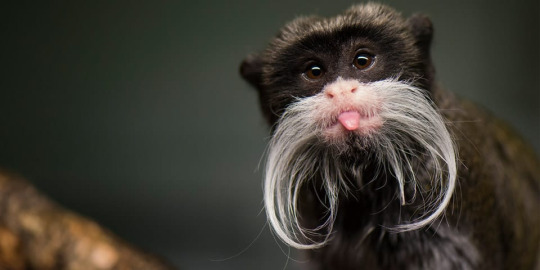

3K notes
·
View notes
Text
Remembering Perspective When Writing Descriptions
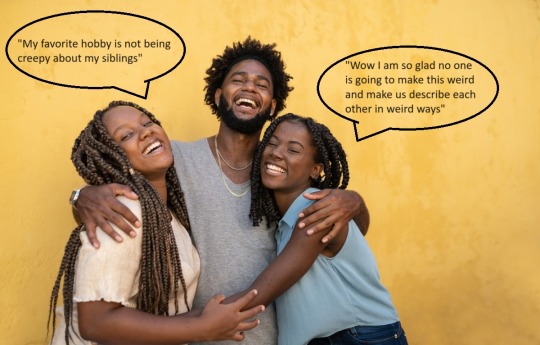
Just a short pet peeve of mine, inspired by a shower thought, where I remembered the most terrifying description I'd ever read.
It wasn't bad, or even horror. It was well written.
However. The POV character described his *sister* in a way akin to this (my recreation, not the actual text):
Braden met his sister at the gate. They'd been apart for several years, and in that time, she had truly become a woman. Her curves had filled out, and her red silk dressed strained across her tight figure. Her long black curly hair shone in the late evening light, while her blue eyes watched him intently.
No, this wasn't a brocon thing. The (male) writer was just horny for his female character and ... kinda forgot that his MC, her brother, would not feel the same way.
Now, of course siblings growing up together are going to notice the other one maturing, but it's not going to be ... that. This is how I describe 17-year-old Uileac looking at his little sister, 13-year-old Cerie, in 9 Years Yearning:
She'd shot up in height this past year - almost as tall as him, to his dismay. Whatever they were feeding her in the meronym was quite good for her metabolism, as she'd put on a bit of healthy weight. Her cheeks were losing their baby roundness, and the autumnal light accentuated the sharp intelligence behind her green eyes.
In this description, you can feel Uileac's paternal attitude toward his little sister. "Oh, she's put on a bit of weight and isn't a total twig anymore! I'm glad they're feeding her well. Her face looks more adult. Fuck, she's almost as tall as me now ... I wish I weren't so goddamn short ...."
This is a much more normal way for siblings to talk about each other, if a bit more "dad mode" than the typical older brother.
Siblings who grew up together are not going to say "holy shit I can really tell my sister has become a woman, wow her dress is tight over her curves." If my brother had said that about me while we were kids, I'd throw up and dump a pot of soup over his head.
This kind of thing is generally accidental and has to do with how *you* feel about a character. But the thing is that even the sexiest femme fatale is just going to be Jennifer, The Stupid Annoying Sister, to their sibling. Our brains are literally wired not to see our siblings as sexy if we grew up with them.
There are many other ways that you must take perspective into consideration when writing descriptions. Here are just a few of them.
Sexual attraction/orientation
You're going to focus on different things if you're sexually attracted to someone; namely, you'll focus in on things like breasts, legs, abs, etc. You'll also likely devote more attention to describing people of your particular sexual orientation than you would one that you are not attracted to, and you will focus on different things.
This is part of why we hate "men writing women:" they describe every woman as if they want to fuck them. (See the first example.) It has to do with the places that their gazes naturally linger on any woman, which is what they consider important and what they focus on.
But the thing that they miss is that just because we are sexually attracted to a specific gender does not mean we would want to bang anyone of that gender. I am a lesbian, but the way I would describe my mom or my therapist is vastly different than how I would describe a woman I am actually attracted to.
Romantic interests should get a more sexualized gaze; not exploitative, just more in-depth, and with more focus on their figure, specific details, etc. Everyone else should get a more basic look at eyes, hair color, height, build, and so on.
Feelings about a particular person
You're going to be more forgiving and complimentary toward someone you care about than someone you hate. Things that would be charming on a friend will be downright annoying on that one asshole at work who always throws projects to you at 5pm on a Friday.
A lover's thick eyebrows might be called "dashing" or "strong," while on an enemy, they'd be "overbearing" and "harsh." Your bestie's lisp is cute, while it seems babyish on your school rival. Your dad's meandering sentences give him a sense of harmless musing, but they make someone else look like an idiot.
If you have a character that is prejudiced toward a given group, they are always going to describe that group more harshly than they would a favored group. If they don't like authority figures, a police officer leaning toward them will seem menacing, when they wouldn't even notice it otherwise.
It can be very fun to give two characters similar traits but describe them differently based on the POV character's perspective of them. Readers might not even realize that it's the exact same physical feature!
Previous experiences at a given place
When describing settings, we're going to give more attention to somewhere we care about, like our home. I imagine you can tell me about every chip in the paint in your bedroom, or that one weird stain in the floorboard that you've tried everything to fix. Many times, this is a good time to add depth to the character's backstory by briefly mentioning previous occurrences there.
Would you notice any of those things about a place you're visiting for the first time? Probably not. You'll give a more global attention to the scene and provide impressions, not specifics.
Depending on how nervous or adventurous you are, you'll look for similarities or differences to things that you're accustomed to. You might compare it to other places you have been, trying to get a frame of reference.
If you're on a vacation and were really looking forward to coming to this specific spot, you will likely hone in on exactly what you came to see, whether that's the scene from a particular hilltop or a cafe, and this will get the most description.
Current Mood
Descriptions change with a character's mood, even if they've been in that place a millions times. People just notice different things depending on their mood; if they're happy, they'll look for things that support that mood, while if they're upset, they're pointing out the negatives.
For example, consider someone walking into a court room when they are on trial versus when they are there as a simple court reporter. The person on trial is probably going to be glancing longingly at the door, picking out the angry faces of observers (or assuming the observers are angry), focusing attention on the security guards, staring at the plaintiff with hate in their eyes.
The court reporter will likely pick out anyone they know in the room before looking at anything else. Then, they'll check out the defendant and plaintiff with idle curiosity. Since they are more familiar with the room, they'll gloss over the boring details that they have already seen a million times, giving them only a cursory once-over to see if anything has changed.
Current Need
Your character's objectives need to taken into consideration as well. As an example, remember the last time that you really needed to pee while you were out. Were you slowly and casually admiring the scenery? No! You were hunting for the bathroom. If literally anything registered for you, it was anything that looked vaguely bathroom-sign-shaped. Everything around that bathroom sign, and on your path toward the bathroom, got more attention and description to you than anything else.
Your character's interests
When describing a scene, you don't need to take time and define every single little thing in a character's path. It's annoying and overwhelming. You need to give us a basic overview (it's a forest, it's a grocery store, it's an abbatoir) and then hone in on the specific details that your character finds interesting in order to fill out the entire scene.
We, as people, focus on things we care about, things that we feel are relevant to us. Different people will notice completely different things when they walk into the same room. An animal trainer will appreciate a big pet bed and an ergonomic food bowl. An artist will admire the artwork on the walls. A computer nerd is going to roll their eyes at the scuffed-up Mac laptop.
This doesn't mean that you can't describe other things, too; it just means that your character's attention is going to be drawn to stuff that they, in particular, like or dislike.
Things like where a character's gaze lands, how they describe things, and how much detail they give to any particular element are an important part of secondary characterization: how we get to know a character beyond what they do or tell us. It helps to create a fuller picture of their relationships, their interests, and their thought process, and it deserves just as much attention as actions and dialogue.
If you enjoyed reading this, perhaps you'll consider purchasing my book, 9 Years Yearning. No weird sibling vibes I prommie
#writing#creative writing#writers on tumblr#fanfic#writing advice#writing tips#on writing#writing resources#writers on writing#writing reference#writing stuff#writing things#about writing#writing problems#writer problems#writer stuff#writerscommunity#writblr#writing community#writerblr#writing blod#beginner writer#tumblr writers#young writer#writer#writers#writers life#writer things#writing life#topazadine writes
299 notes
·
View notes
Text
honestly one of the things that's been wild for me to learn lately is that israel was responsible for enforcing the idea that the holocaust was an unparalleled genocide that stands apart from everything else that's happened in the course of human history. even before i understood well enough how deeply interconnected all genocides are, when i was a kid, i really fucking hated it. it felt so wrong to me for the holocaust to be The Genocide of human history. it felt disrespectful to other groups who had gone through genocide and it felt like weirdly dehumanizing and tokenizing to us. i didn't want to think of jews as The Group Who Went Through A Genocide, i wanted to see us how i was familiar with in our culture our holidays our art our singing our prayers. that's how i wanted other people to see us too! not that i was ashamed of what we had gone through but i just didn't want people's perception of us to just be that we were victims and i didn't want other peoples victimhood denied to them through that either. but yeah kind of wild to learn that israel and zionist rhetoric seems fairly responsible for this pet peeve of mine from childhood before i even really had a greater consciousness of solidarity or anything.
#genocide mention#holocaust mention#there was something about like ''contextualizing the holocaust'' or something maybe it was ADL or something#i don't understand how isolation is empowering#like obviously the holocaust is significant and huge and gut wrenching and i do think it being part of the modern jewish identity makes#sense but i don't want it eclipse everything else about us i think the idea that the most accessible knowledge to people that weren't#jewish about judaism was that we had been murdered and nothing else upset me. because we have candles and bread and songs and#i feel like i'm over clarifying i doubt people would take this in bad faith anyway i just get nervous
642 notes
·
View notes
Note
hello! feel free to ignore me if this is slightly outside the boundaries of this account, but i'm a tabletop roleplaying game (ttrpg) designer looking for opinions on mechanics for disability in games.
my game specifically covers a lot of themes that, while not about disability, would make me feel remiss to not include some explicit mention of how physically/mentally disabled characters fit into the greater picture of the game. it has a specific focus on telling stories of diverse characters, for one, and on fighting the unfair capitalist systems that harm these marginalized groups.
my issue lies in how, exactly, to both treat this topic respectfully and make the characters not feel out of place or unbalanced. i've considered several options, and was curious to hear from a physically disabled perspective how to proceed (i am mentally ill & neurodivergent, but to my knowledge not physically disabled).
option one: mention that disabled characters of all kinds are encouraged, and talk about roleplaying them or provide resources for how to handle them respectfully, but don't apply any specific rules with hard mechanics or numbers to them. this option is least likely to be inadvertently misconstrued or written poorly on my part, but may make disability feel like a "flavour" side note.
option two: provide examples for some common disabilities on the mechanical effects (such as a low vision character rolling less dice on rolls to notice visual details) without any "counteracting" mechanics. this one gives mechanical weight to disability, so it feels less like an afterthought, but may discourage people from playing disabled characters as they would be more likely to fail than other characters.
option three: the above, but with mechanical incentives for roleplaying in a way that acknowledges the character's disability. a "benefit", but less "giving a blind character echolocation" and more "gain XP for showing your characters disability and any aids they use" (similar mechanics exist for following your character's goals/personality traits). this would make disabled characters be more on par mechanically with other characters, but i fear it may come across as... viewing disabled characters as not worth it without some sort of benefit, i suppose?
apologies for the long rambling message, but i'd love to hear which of these options (or another suggestion) you'd be happiest to see in a game written by someone who isn't physically disabled! this is far from the focus of my game, but it's still an important part of the greater theme that i'd love to be able to get right. thanks!
(similarly, if there are any groups not covered in the "underrepresented but common disabilities" post from your FAQ that you'd want to see in a game, i'd also be happy to hear those!)
Hello!
First things first, thank you so much for thinking about this! This isn't something that most TTRGs consider and, as a massive nerd who plays DND, Pathfinder, and other tabletop games, this has always been a big pet peeve of mine since making a disabled character is always unnecessarily hard to do with the game mechanics and rarely works out well.
Most of the time, I have to talk to my GM about how to make it work in their game and, unfortunately, I'm often told they won't allow it because it's "too much trouble".
This is all just to say, I really love the idea here and the fact that you're actually thinking about these things and wanting to do well by them is great!
Now, taking a look at the options:
Option One
One of the unfortunate things that I see a lot is people that are too scared to get something wrong with representation (Or social justice on a broader scale) that they don't try to do it at all. With this current era of cancel culture and people's reactions to what they deem 'offensive', it's understandable to be a bit apprehensive but if you're approaching the subject from a place of respect and you're receptive to learning and improving, most people will appreciate the effort.
While this option does sidestep the main issue you've identified, I do think it sidesteps the attempt at making disability part of your game as well. You can encourage people to make disabled characters all you want but without any real content for them in the game, it won't do much.
If you do go with this option, I'd strongly suggest including some information on the culture of your world and how it relates to disability, both to provide more substance to the content and to give players a bit to go off of when making a disabled character.
Option Two
I like this option much more than the first one, though I do agree that it may discourage people from choosing to play a disabled character.
Within the game mechanics, I think it makes a lot of sense to have these kinds of effects but I would encourage you to include more variety with it. Disability isn't 'one size fits all' and two disabled people can have different needs, strengths, and experiences -- even if they have the exact same disability. Instead, I'd suggest going for a slightly different model that includes more choices.
For example, a character with low vision may:
- Roll lower on perception checks involving vision
or
- Have disadvantage with ranged weapons/attacks
or
- Have lower rolls/less success in dim lighting
Do you see where I'm going with this?
Having more options for how the character's disability affects them allows players to make a choice for how they want to play the character while also encouraging them to think more about how their character's disability might affect them and impact their life.
The examples given are all reflections of how blindness can affect somebody. Blind spots or blurry vision can make it more difficult to notice certain visual changes, severe nearsightedness can make it difficult to aim/focus on things that are far away, night blindness can make it difficult to see in the dark or in dim lighting, etc. That being said, there are dozens of other ways to go about this (Though I'd advise sticking to five options per disability at most to avoid overwhelming people).
Option Three
Personally, I like this one and the second option the most. Although I understand where your concerns are coming from, it feels less like it's implying that disabled characters have to be 'worth it' and more like it's just balancing it out.
Like with the second option, I'd suggest going for more of a choice model here where the player can pick what 'benefit' (For lack of better word) that their character has -- or even to choose no benefit at all.
Many physically disabled people develop our own skills or tools to compensate for where we struggle, whether this is an intentional decision or just something that happens.
For example, my boyfriend is paralyzed from the waist down and uses a wheelchair full time. As a result, he has kick-ass upper body strength from it.
Similarly, many deaf and hard of hearing people are more observant when it comes to visual cues and many blind people are more sensitive to other senses (Though, of course, the whole 'super senses' thing is a myth).
While this isn't true of all disabilities or all disabled people in general, it is something worth considering.
That being said, if you do decide to implement this option, make sure that the benefit makes sense for the disability or is related in some way and isn't just something random being tacked on -- that would make it seem more like a 'disabled characters need to be worthwhile' thing.
As a few extra notes:
If you go with the second or third option, I'd suggest separating the different stat effects into different types of disabilities. You don't need to go too into specifics with it but something like 'low vision/blindness/vision loss', 'deafness/hearing loss', 'limited mobility', and 'chronic illness' would work. While disabilities are more nuanced than this in real life, setting it up this way would keep it pretty simple and allow players to tweak the mechanics slightly for their own characters.
If you go with the first option, I'd probably avoid discussing how to roleplay disabled characters. Because roleplay and character development is much more open than stats and game mechanics are, showing one or two 'proper' ways to play a disabled character is more likely to reinforce stereotypes, dismiss certain experiences that disabled people have, or just come across as more of a 'lecture' than anything. The same goes for including information on what to avoid. I'd stick to providing information about your world and how disabilities are seen in them instead of giving instructions here.
I'd suggest including ways for players to bypass the mechanics of disability if they'd like to, even if their character is disabled. That would allow for a bit more freedom with how they portray their character and would also ensure that they aren't being 'penalized' (For lack of a better term) with their stats for playing a disabled character. As a bit of an example of what I mean: A character in DND could have been a criminal growing up without necessarily taking the Criminal/Spy background.
In general, I think as long as you're approaching this respectfully (Which you are!) and reaching out to physically disabled people for their input (Which you are!), you don't have to worry too much about misrepresenting it.
Cheers,
~ Mod Icarus
102 notes
·
View notes
Note
Hi Crow,
Apologies if this has been asked before but I’m trying to get to the bottom of what people describe as ‘biblically accurate angels’ and I’m getting conflicting results and I thought why not ask someone who definitely knows more on the topic than me. Is the incomprehensible multi-eye wheel creature thing true?
"True" is the problem, because... it is, and it isn't, and it depends, and it's complicated!
I looooove angels, you're right, and I was working on doing a vid on this exact topic because the term 'biblically accurate angel' is a pet peeve of mine. However, no matter the power of my autistic angelic obsession, I wouldn't say I'm a perfect source. I got intimidated outta making that video because I got too anxious of messing it up and losing my angel cred. BUT! I do know some stuff.
What's wrong with "Biblically Accurate Angels?
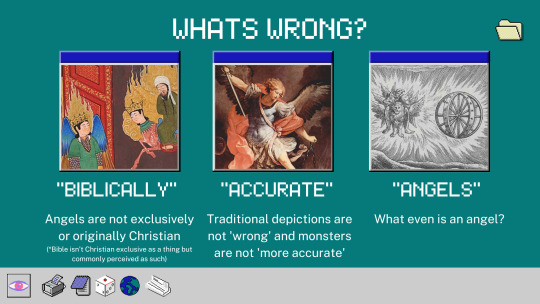
Three things!
1. "Biblically"
Most people I see, when confronted with the word 'Biblically', think of Christianity. The Bible technically refers to a collection of texts shared by a number of Abrahamic religions, but I've a lot of people entirely unaware of that fact. There's often a general lack of recognition around 'biblically accurate angel' posting that angels aren't exclusively or originally Christian concepts. Tumblr is an outlier of a place, remember; I read youtube comments.
2. "Accurate"
This makes me lose it, just a little bit, because the idea 'real angels in the bible actually looked like scary monsters' is both incorrect and kind of a rude thing to say about a holy entity a number of religions believe in.
There are a lot of ideas of angel classification and hierarchy, but you'll usually only see one--- the Christian one. This has nine orders in three spheres, going usually angel, archangel, principality (3rd sphere, most humanoid), powers, virtues, dominions (2nd, basically no lore), thrones/ophainim, cherubim, seraphim (1st, weirdo patrol). The lowest spheres are closest to humanity, the highest are closer to the divine.
(it's worth noting there's a big difference between 'what is exactly in the canon holy text' versus 'writings/visions/ideas from scholars later'. There's differing opinions everywhere and also different sects.) Little is universal.
Speaking of, religions! Heard of them? Angel hierarchy as it's commonly see is very specifically a Christian angle! There's a number of different Jewish angelic hierarchies which include different types or interpretations of angels. There's usually 10 ranks instead of 9 too.
I know the least about angels in Islam, but they don't have a strict angel hierarchy either, though some angels are more important than others.
As for angel physical descriptions, it varies. They can take human form, but they're spirits doing that for our convenience. Some of them are doing weird stuff, but most of the time an angel is some essence of light and fire taking a lesser defined shape for our convenience.
Some of the main ideas of a 'biblically accurate angel' come from one of my fav bits of the bible, the chariot in Ezekiel.
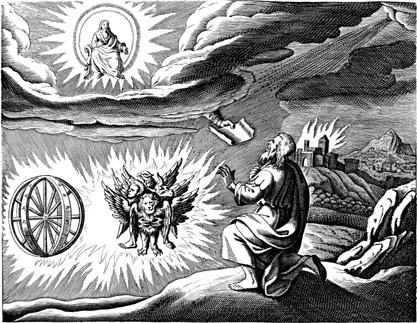
If you've not read the fun weird bits of the bible before, let me introduce you!!
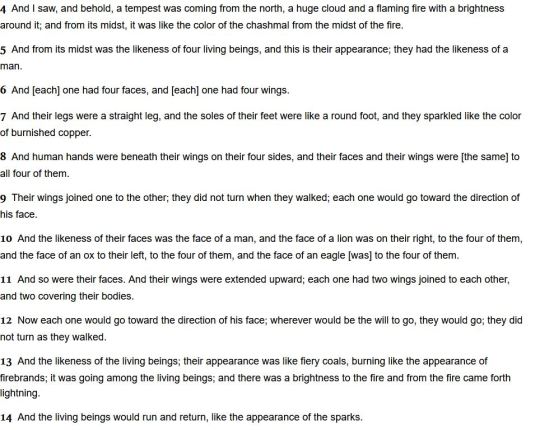
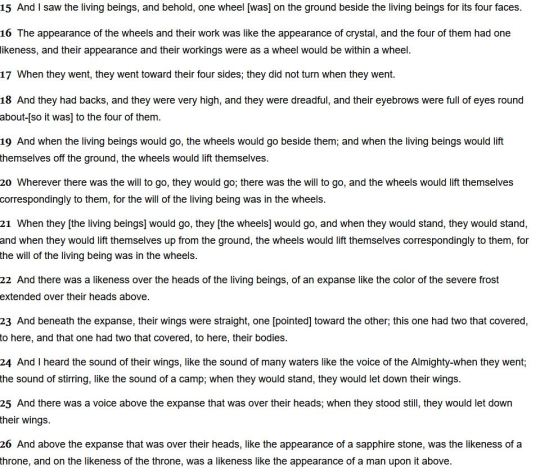
These are the Living Creatures which are considered Cherubim in Christianity. The wheels are the Ophanim, who are also Thrones. The whole thing sounds like a very intricate chariot rather than a bunch of angels, but hey, it says right there they're 'living beings'
3. "Angels"
What is an angel anyway?
Well, there's an answer, but as I think I've highlighted there's a number of different, varying ideas of them which are all equally valid! This can include, of course, the artistic choice of making them monsters ( I love doing this ), but it's incorrect to assert such a design is 'more or truly accurate'.
Angels are messengers. The word for angel originally was Messenger, and the role of angels is generally to serve as a conduit and messenger of divine will. They can be teachers or healers. They often are more extensions of the holy rather than truly independent spirits, good because they are divine rather than the choice of free will. (but like everything I'm saying it depends bc religions and opinions are not unified monoliths).
Not all angels are messengers. Even without a strict hierarchy, there's a common idea of specific angels for specific jobs. The idea of Archangels is also common, though which are and how many differs wildly, as does their function.
Angels are divine beings. Humans don't become them. There also are some sects that believe this, like the Latter Day Saints, but generally the divide between human and angel is very clear. Humans are generally above angels, because we're beloved new ocs.
angels are cool. I really like them
---
anyway, this is a very approximate ramble for you on the subject. I think I could have gone on in much more detail and I decided not to. Especially as I note I don't have that kind of 'learn and memorize everything about your special interest' kind of autism, just 'a lot more than normal over many years'. Angels are a really complicated subject because religion is, and it all differs. But I do dislike Biblically Accurate Angel because I think it's really misled people who come across it casually. Yes, there's weird angel stuff, but it's pretty rare (especially in common canon), and it isn't 'the secret creepypasta truth'.
#angels#sometimes theres asks#god I think this is a normal anxiety/autism thing but I am always so paranoid#of posting something like this and getting like 800 corrections and getting a Bad Grade In Angels.
86 notes
·
View notes
Text
Dungeon Meshi Quick Reacts
Ch.26 (Red Dragon)
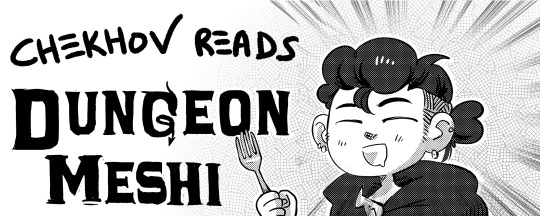

THEY'RE. SO. DANG. CUTE.

Damn these kids. I also love the fact that Falin has different hair as a child. Kids never changing their hairstyle as they grow into adults is such a storytelling pet peeve of mine.
Also: Laios at his most rambunctious? You mean now? Currently?
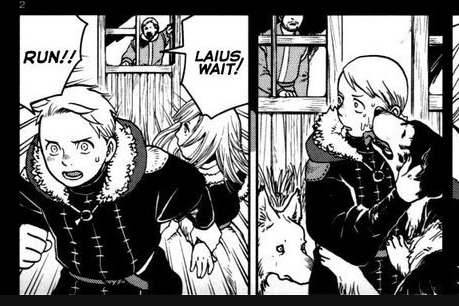
This man saw his son and daughter outside for half a second and already somehow knew they were up to shenanigans.
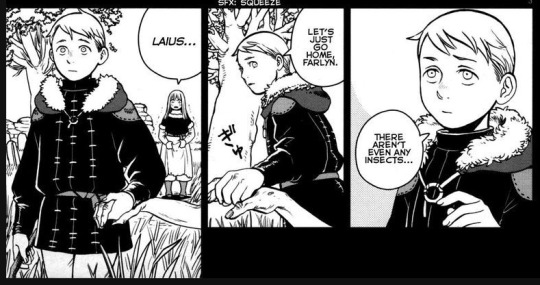
Oh no, he grabbed the wrong hand! How embarrassing. Hate it when that happens.

Bro, he's like 10, you need to find a better person to yell at.
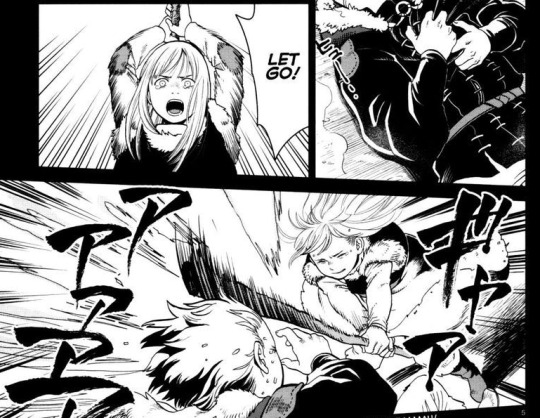
That was solid. A konk on the head that came straight from the heart. The kind only a sibling can give.
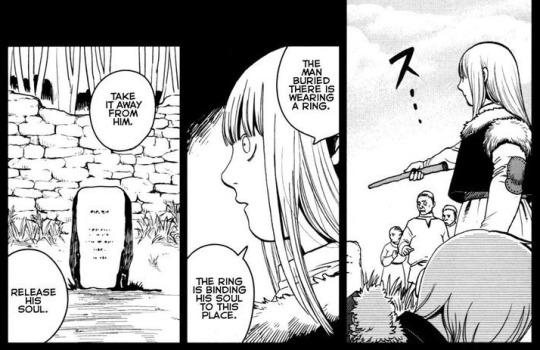
.....th-thank you, pokedex junior...?

I would be thrilled if my kid knew how to ward off the undead! Well... I guess maybe thrilled is the wrong word for it.... There are certainly some complications to consider.
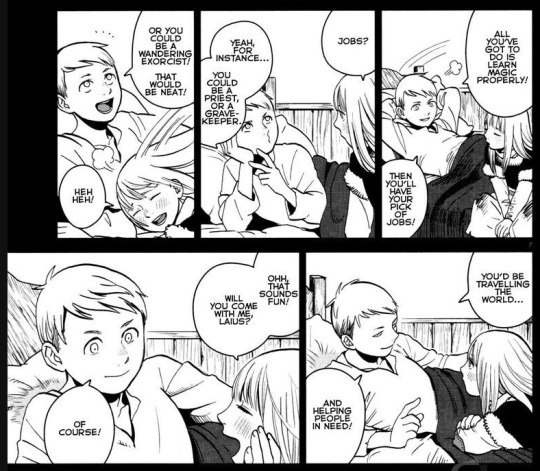
He's so cute. He's such a good brother!
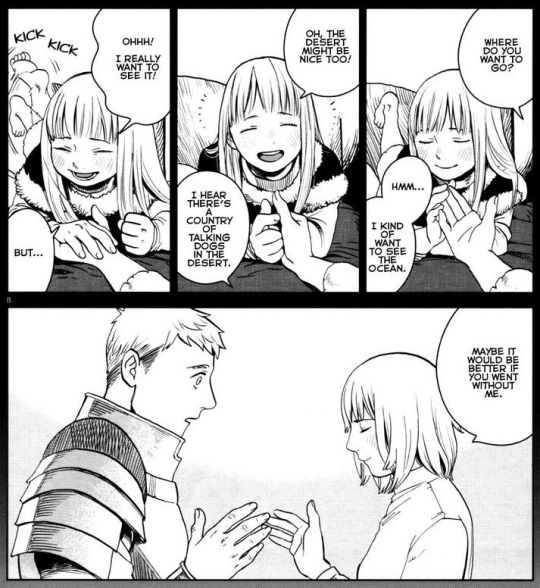
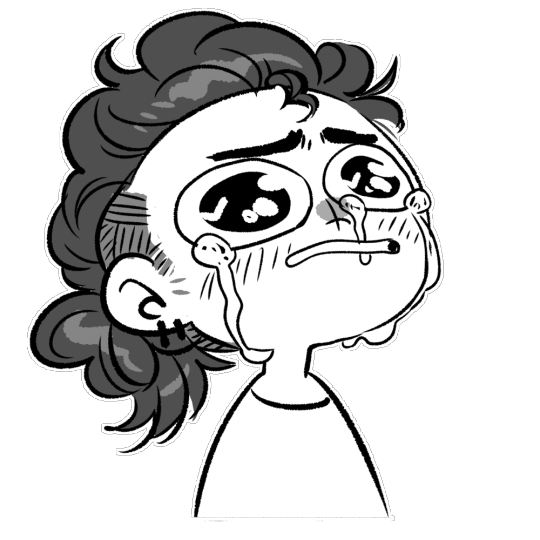
HEY, THAT'S ILLEGAL.

Now that you mention it, healing magic stitching entire wounds closed so quickly would probably generate not only a lot of strain, but also heat, and also an insane amount of... well, if not pain, then at least itching on par with pain. That's SO MUCH REGROWTH.

Gotta give it to Marcille, she ain't bitching about things being weird now. Girl's FOCUSED.
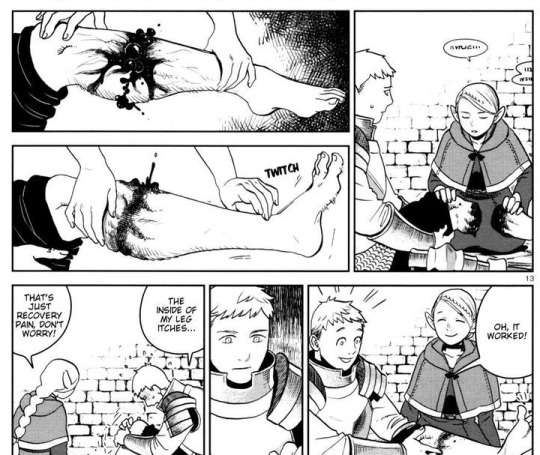
Horrifyingly simple. I love it.
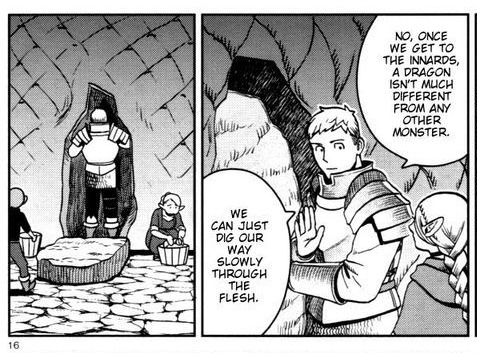
He really is just going to CoolAid man his way in there, huh.
But seriously, they're just walking on it! How are they slicing so cleanly? What about bones? They can just... what... cut between the ribs? What about the peritoneum or whatever? If they cut enough of that, wouldn't the innards start spilling out?

So Falin either wasn't eaten or... was already digested......but why would it be COMPLETELY empty?
It's not rested in THAT long... AND it fried up a bunch of Worgs and didn't eat them, now that I think of it. What's the use of killing prey and not consuming it, for a creature that has such a high caloric need?

Laios, mate, you good? Marcille is having an understandably stronger reaction to losing Falin but you're just... coping I guess?
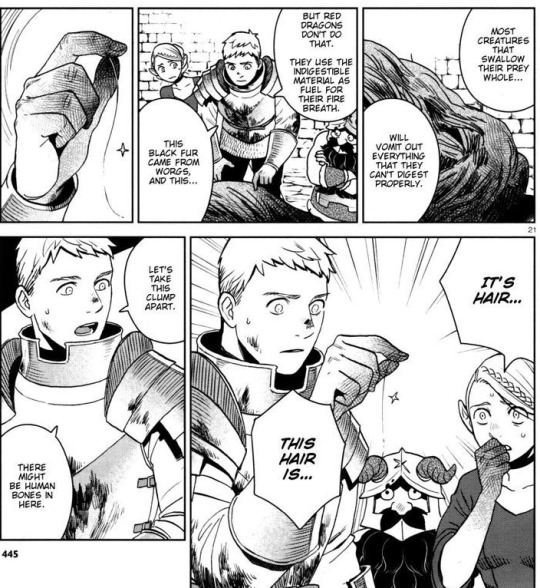
You know, as someone familiar with ttrpgs this line of reasoning is solid. Resurrection spells need materials from the body to be effective. But to anyone else, this MUST be creepy as hell, right? Or am I overthinking?
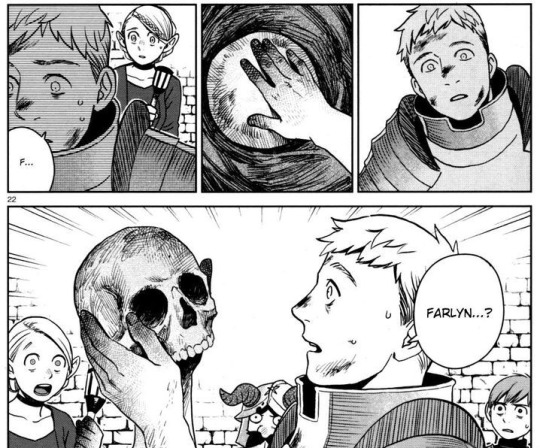
................how do you even begin to come to terms with a death if there's nothing too big to come back from?
How is it that it's only NOW that I'm thinking of it?
#dungeon meshi#dungeon meshi quick reacts#chekhov reads dungeon meshi#delicious in dungeon#dungeon meshi liveblog
227 notes
·
View notes
Text
y'know what a big pet peeve of mine is?
the phrase "this isn't for you" appended to "pro-/endos dni" on posts about trauma. usually trauma recovery. not necessarily about CDDs (though i'll get into why that's ALSO fucked up in a bit), but just about trauma in general.
i am a big believer in curating your space. i curate mine; i don't like how aggressive syscourse tends to be, so i don't engage in it in the way people may expect me to with my username being "wondercourse" lol. i don't really care what "side" they're on, what matters to me is how they treat others. it is okay for you to set boundaries surrounding your interactions with others, including those you don't want to interact with. i'm not saying you shouldn't do what you need to do to feel comfortable in your space.
but why not leave it at "dni" (this is also about the "fuck off" tag but that's a whole different conversation)? why append "this isn't for you"?
that implies that whatever kind words you said in that post, whatever encouragement you wanted to give, whatever "positive" thing you were trying to do, isn't deserved by the people you don't like.
even if someone who identifies as endogenic is a trauma survivor, "this post isn't for you".
even if they're person with a CDD who happens to "believe in" and/or support people who identify as endogenic, "this post isn't for you".
if you are "wrong" in someone's eyes, "this post isn't for you".
honestly, to me, it minimizes the words. they're not actually for all trauma survivors. they're not for all people with CDDs. they're for the ones that you find palatable. and that's...uncomfortable, to put it as kindly as i can.
and it's so unnecessary. it is not equivalent to just saying "dni". you are NOT the arbiter of what people deserve or don't, especially when it comes to trauma support/solidarity.
and maybe this is just me misinterpreting the phrase! but it just makes me skin crawl. like idk if there's really a way to justify it that would make me go "oh, i get it" because i don't (but i'm open to discussing it). why not treat each other as human beings deserving of respect and healing?
anyway, this has been a long enough post. i'm tired. i don't know if this even bothers anyone else. but it bugs the shit out of me.
oh, i was going to keep this in the tags, but this is something i want people to see: i mostly see this with people who identify with being anti-endo. but if you identify as pro-/endo and you do this "this isn't for you" thing on general positivity/recovery posts, then this is also about you. and if you don't, then it's not lol.
#syscourse#idk if this belongs in sysconvo or not so i'm just keeping this to syscourse#anyway this post came from 🌃 realizing that we're bound to be excluded from cdd spaces now that we're exploring other forms of plurality-#thanks to this subsys shit that's happening right now#even though........we have DID#i had to edit this a lot because i got really pissed off about this
88 notes
·
View notes
Text
So the 1990s movie Independence Day was everywhere last week (for obvious reasons), and I was reminded of a particular pet peeve of mine in media: the big disaster epic where thousands or even millions of people die, but that’s not meaningfully acknowledged because we’re so focused on the eventual triumph of Our Heroes.
On one level, I get it. It’s hard to make an exciting, crowd pleasing movie if you stop the momentum at some point to mourn the catastrophic loss of life that goes along with your big action set piece. But honestly, that’s all I’m thinking about anyway when a major population center gets blown up or wave after wave of soldiers get mowed down or whatever. Who were those people? How did the loss of each one change the world in some way? How do you pick up the next day without them all? And that’s something I’ve always thought Tolkien, by contrast, did very well!
No, he doesn’t spend page after page giving us the backstory on every rank and file soldier to die at the Pelennor Fields, for example, but he does acknowledge that the victory was every bit as tragic as it was triumphant. He takes the time to give us the names of both captains and nobodies who died before we ever got to know them. He shows us there was a real human impact, and by giving us those names, he invites us to think more about them. Who were they really? What were their lives like? Who loved them back home and will miss them when they don’t return? Tolkien engages with that and even sometimes for the enemies, such as the Southron who dies at Sam’s feet in Ithilien.
I’m not necessarily on the same page with the broader culture on this point because a lot of people don’t seem to have this particular hang-up about their media and would (perhaps rightly) view too much of a focus on that kind of thing as extremely depressing, which is not what everyone is looking for in their pop culture diet! But I love and appreciate Tolkien for it anyway. And it’s probably no coincidence that a lot of those Name Only — or very close to it— dead guys are the ones I gravitate to the most easily in my own thoughts and fan fiction.
#random thoughts#mass destruction has consequences#that i want to see acknowledged#Name Only dead guys of middle earth#Mounds of Mundburg song my beloved#lotr#tolkien
92 notes
·
View notes
Text
“Ain’t nobody call the Fuzz in this neighborhood cause they know better!”
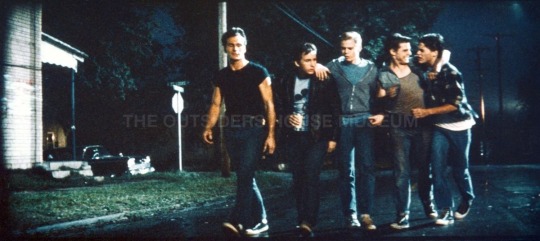
This line sits with me as a very telling one that often goes overlooked, as it’s lost in the blur of energy before the rumble. Now most of this is going to be from existing knowledge but it did prompt me to dig into poor communities a bit more. The line is said differently between the Book and the movie but both are said within the idea of pride and community— when they’re caught up in the high of before a rumble, all the energy close to bursting out of them- repping their kind and going on this spree of yelling stereotypes and taking ownership. In the movie Steve’s much more happy and hyped as he yells it— in the book he also says it to correct Darry but in a more exact tone.
In a surprise to no one cops aren’t friends to poor communities. Economically poor, crime heavy communities tend to be over policed and often met with force, brutality etc. We know the boys get hauled in a lot, sometimes just for the assumption they did something. Cops pick out, they stereotype and often target within the neighborhood.
There’s a social aspect as well that’s not so direct to do with police action and that is the social isolation. Lack of resources, mistreatment and disapproval from those outside creates strong communities that further isolate. In a lot of ways it’s a helpful thing, mitigating the effects of poverty by having a social net and trust. A detail I like is that Darry seems to be a part of a phone tree when Pony was late the first time (not exclusive to poor areas but a great example of having networks.) People help each other out “help their own” building networks. A lot of work is under the table or can be barter based - questionable legality of work, building/fixing things, way of general running of life. Perception of law is different.
This isn’t to say everyone in the neighborhood has broken the law at some point but it’s likely a lot have at least something of questionable legality or more likely have family members who are greasers, criminals etc but will protect them. All of the guys instantly flock to go help Dally after he robbed the store and have been stated to hide and protect the guys whenever they do something like this. It comes back to the “help/protect your own” … no one in the neighborhood is calling the cops because they know what will happen if they do. A family member or friend might be taken in, potential brutality, people coming in and uprooting the way you live your life because it’s “abnormal” etc etc etc.
If someone does call the cops who do you think they’re going to help? A bunch of no good, greasy hoods or the nice boys from the other side of town with their khakis and new cars and clothes? It was probably a greaser who threw the first punch too… doesn’t matter their side of town or what its over, or if some Soc is standing over some bleeding greaser kid. It’s systemic. (An aside but this is also why it drives me nuts people would assume the boys to be bigots because they’re … lower class in the 60s… let’s do some introspection there. Added to the fact that, there’s a lot of overlap with racial issues, their community would likely be FAR more integrated than the west or even rest of the town. Not that their wouldn’t be ignorance but the assumption— that’s not the point of this post but a pet peeve of mine)
Anyways, the Outsiders often gets reduced to a simplistic “use vs them” of just Greaser vs prep like it’s one of the beach movies they watch. When in reality it’s actually a lot to do with class and societal expectations/conditioning.
—
Papers if interested Here and here
Either for general interest or potentially helping with writing. Ones an older study (which skimming and certain sections I found interesting), the other IS Wikipedia but it’s for the general idea
#the outsiders#outsiders 1983#outsiders#steve randle#charecter study#outsiders meta#Curtis gang#essay#details
55 notes
·
View notes
Text
Oooh I am so tired of the twinkification of haikyuu characterssss Istg if I see one more fanart of Ushijima where he looks like the love interest of a shoujou anime, and is lean/skinny I'm gonna actually scream wth guys he's beefy he's MUSCULAR he is a professional athlete and is like 6"4 I keep seeing fanarts where he has more of Tendou's physique and it bothers me sm like I always see fanart of him and I don't recognize its him cause he's so skinny and I'm like "Who is that? He's wearing the Shiratori- Oh my God, that's not Ushijima, is it????" And then I check the tags, and it is, and I'm like ???? Like, I'm all for drawing characters according to your headcanons, but Ushijima??? Lean??? And I'll go on Pinterest to get ship stuff bc it's less organized and lowkey easier to find stuff since it's just pictures, yk? But I'll look at it, and it's all that weird ass 2000s-2010s artstyle. Take Tsukihina, for example, and Hinata looks like a child. Like Tsukishima is HUGE, and Hinata is TINY!! Their height difference is not that big. And I feel like a lot of it is from comics or doujinshi, and the style just looks like it's from something R rated ykwim???? Like all of it is just helpless baby Hinata 🥺🥺 and his huge tall 'alpha' bf Tsukishima who hates everybody but him. Like they just take random characters and twinkify them; they make them overtly feminine for no reason and it makes me sooo madddd I am sick of fuckin Thumbelina Hinata and Levi Ackerman Ushijima make it stop!!!! OR THE OPPOSITE WHERE THEY MAKE RANDOM CHARACTERS SUPER DOMINANT AND SEXY AND WEIRD BC 1 THEY ALWAYS USE THE HIGH SCHOOL VERSIONS OF THEM AND 2 THEY ARE FUCKING LOSERS AND NERDS THEYRE NOT CALLING A GODDAMN SOUL "BABYGIRL 🫦😩" THEY ARE CALLING EACH OTHER MORONS AND INSULTINF THEIR HAIRCUTS **edit, I just wanted to add that all the fanarts I see of the popular characters, e.g ushijima, atsumu/osamu, oikawa, etc, all have the same exact face toooo, And I actually HATE the kind of art where people make them *so* buff they look like a Jojo or DBZ character,, someone who reblogged brought that up a bit and REALLL I hate it. And this is kinda irrelevant, but I think people also forget that people's body types change over time. Changing a characters body type (at least according to the character/source) should be fine, as that's what happens as you age. A character from an apocalypse show probably isn't gonna be super buff, but rather lean bc yes they are technically working out in the fact that they are traveling a lot and idk like killing zombies or whatever the basis for the show is, but there's also gonna be a loss of food yk, so they'd still be rather skinny. And that'd be the case for any body type. A high schooler isn't gonna have the same body as an adult, and people don't usually account for that, which is fine, I'm not saying anybody has to because it's such a small thing usually, but it's just a small pet peeve of mine. (I want a muscular post time skip Osamu with some chubbiness so bad he loves to eat, but he does still like working out. I just know that man has some chub on his stomach and I want it 😩😩)
#haikyuu#haikyuu!!#hinata shouyou#hinata shoyo#hq hinata#ushijima wakatoshi#haikyuu ushiwaka#hq ushijima#tendou satori#tsukihina#tsukkihina#tsukishima kei#hq tsukishima
101 notes
·
View notes